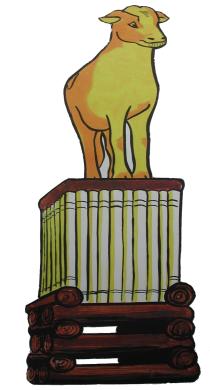
Acts 17:15-34. Idol to unknown god – AD51.
Paul had just been chased out of the city of Thessalonica. Now in Athens he again finds a group of people to speak to and again ends up with a small group of followers for Jesus the Messiah.
Paul must have had a wide knowledge of other cultures, because in his speech he made references to their own poets, even if they were quoting some of the things the Jewish prophets had said 2-300 years earlier.
An Idol is something you put in place of Jesus in your life.
Background Reading:
Paul in Athens
17:15 The men who escorted Paul took him all the way to Athens and, after receiving instructions to have Silas and Timothy join him as soon as possible, they left. 16 While Paul was waiting for them in Athens, his spirit was deeply disturbed to see the city full of idols. 17 So he began holding discussions in the synagogue with the Jews and other worshipers, as well as every day in the public square with anyone who happened to be there. 18 Some Epicurean and Stoic philosophers also debated with him. Some asked, “What is this blabbermouth trying to say?” while others said, “He seems to be preaching about foreign gods.” This was because Paul was telling the good news about Jesus and the resurrection.
19 Then they took him, brought him before the Areopagus, and asked, “May we know what this new teaching of yours is? 20 It sounds rather strange to our ears, and we would like to know what it means.” 21 Now all the Athenians and the foreigners living there used to spend their time doing nothing else other than listening to the latest ideas or repeating them.
22 So Paul stood up in front of the Areopagus and said, “Men of Athens, I see that you are very religious in every way. 23 For as I was walking around and looking closely at the objects you worship, I even found an altar with this written on it: ‘To an unknown god.’ So I am telling you about the unknown object you worship. 24 The God who made the world and everything in it is the Lord of heaven and earth. He doesn’t live in shrines made by human hands, 25 and he isn’t served by people as if he needed anything. He himself gives everyone life, breath, and everything else. 26 From one man he made every nation of humanity to live all over the earth, fixing the seasons of the year and the national boundaries within which they live, 27 so that they might look for God, somehow reach for him, and find him. Of course, he is never far from any one of us. 28 For we live, move, and exist because of him, as some of your own poets have said: ‘…Since we are his children, too.’ 29 So if we are God’s children, we shouldn’t think that the divine being is like gold, silver, or stone, or is an image carved by humans using their own imagination and skill. 30 Though God has overlooked those times of ignorance, he now commands everyone everywhere to repent, 31 because he has set a day when he is going to judge the world with justice through a man whom he has appointed. He has given proof of this to everyone by raising him from the dead.”
32 When they heard about a resurrection of the dead, some began joking about it, while others said, “We will hear you again about this.” 33 And so Paul left the meeting. 34 Some men joined him and became believers. With them were Dionysius, who was a member of the Areopagus, a woman named Damaris, and some others along with them.
Acts 17:15-34
Other slides in this module:
- He is not here, Jesus has risen from the dead
- 40 Days, Jesus Taken Up Into Heaven
- Jesus returns Home back to Heaven via the clouds
- Matthias replaces Judas
- 50th Day After Jesus’ Resurrection
- Start of the Early Church, The Holy Spirit Comes at Pentecost
- Pentecost Fire, Like Tongues of Fire
- Peter addresses the Crowd
- The Fellowship of the Believers form a community
- Peter Heals the Crippled Beggar
- Peter addresses the onlookers in the Temple
- Peter and John before the Sanhedrin
- Ananias and Sapphira
- The Apostles persecuted
- Choosing of the Seven Helpers
- Stephen seized and killed
- Philip and the Ethiopian
- Paul (Saul) meets God
- Paul (Saul) Escapes In A Basket
- Aeneas healed by Peter
- Peter’s dream and the call of Cornelius
- Barnabas looks for Paul
- AD43 Covered First Ten Years
- Peter’s 2nd miraculous escape from prison
- The Book of James – first New Testament book
- Orphans and Widows – Listening and Doing
- Barnabas and Paul sent off
- Ship, The Port of Seleucia
- Paul in Pisidian Antioch
- Paul heals a crippled man at Lystra
- They tried to kill Paul by stoning him at Lystra
- The return to Antioch to rest after the first trip
- The Book of Galatians
- Paul uses a Scribe
- Start of Paul’s Second Trip
- Timothy, Paul’s disciple
- Philippi – The Fortune Telling Slave Girl
- Paul and Silas in Prison again
- In Athens, the unknown god
- Do not get angry
- Paul returns back by ship
- Paul rests between Trips 2 and 3
- AD53 The end of the first twenty years
- Questions and Answers 1-14
- Questions and Answers 15-28
- Questions and Answers 29-43
- Timeline for Acts part one
- The Book of Acts:- Part Two » »